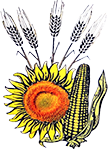Research Regarding the Selectivity and the Efficacy of Herbicide Treatments Applied for Weed Control in Barley Crop under Pedoclimatic Conditions from NARDI Fundulea
Mihaela Șerban, Gheorghe Măturaru, Cătălin Lazăr
National Agricultural Research and Development Institute Fundulea
Keywords: weeds, herbicides, selectivity, efficacy, yields.
Abstract: This paper presents the results obtained in the winter barley plots of experimental field of plant protection laboratory from National Agricultural Research and Development Institute Fundulea, during 2019-2021. During this experiment, the degree of selectivity (%) of the barley plants and the degree of control (%) of the weeds were followed by applying the treatments in different stage of applications - Stomp Aqua (455 g/l pendimethalin), Battle Delta (400 g/l flufenacet + 200 g/l diflufenican), Bison (100 g/l diflufenican + 15 g/l penoxsulam + 3.75 g/l florasulam). Stomp Aqua (455 g/l pendimethalin) and Battle Delta (400 g/l flufenacet + 200 g/l diflufenican) were applied pre-emergent immediately after sowing. Instead, the Delta herbicide (400 g/l flufenacet + 200 g/l diflufenican) was applied in autumn in the post-emergence (stage BBCH 12-13). The herbicide treatments results highlighted their effectiveness in a single application.
The weather conditions from the three years were quite variable from the point of view of recorded precipitation, but the monthly average temperatures were, in most of the cases, above the long-term average.
The barley yields from the plots treated with herbicides were much above the untreated plots (control) (between 211 and 236% of control value in 2020 și and 130-169% from control in 2021).
The treatments with herbicides must be correlated with the degree of weeds infestation, their spectrum and dominance, local climatic conditions, time of application and their technical potential for efficacy.
